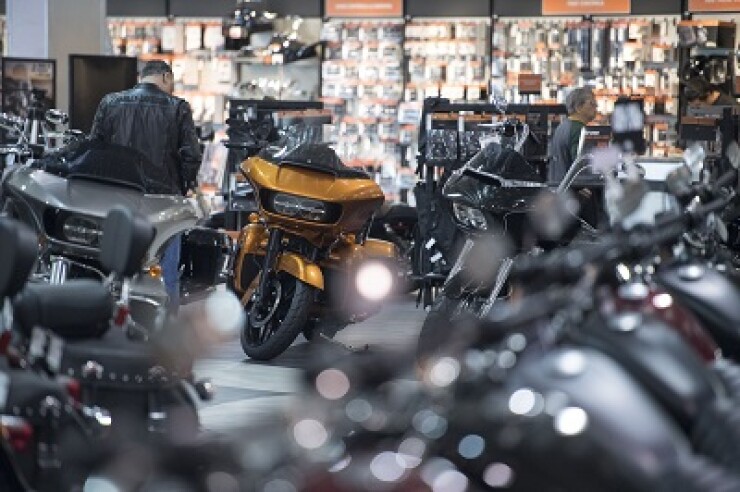While tariffs wreak havoc on its parent company's bottom line, Harley-Davidson Credit Corp. is returning to the securitization market for the first time in three years with a collateral pool of well-seasoned motorcycle loans.
The retail finance subsidiary of Harley-Davidson Financial Services will be marketing a pool of notes secured by loans financing new and used Harley-Davidson brand motorcycles purchased through franchise dealers of the venerable bike brand.
The notes offering will be $552.6 million or $657.9 million, depending on whether HDCC chooses to upsize the Harley-Davidson Motorcycle Trust (HDMOT) 2019-A at closing. Barclays, Citi and Wells Fargo are the lead underwriters of the deal.
The securitization is
Each proposed HDMOT 2019-A pool will include four classes of senior notes. The smaller pool total proposes three term note tranches, all with preliminary triple-A ratings from Moody’s Investors Service and Fitch Ratings: $187.3 million in Class A-2 notes due May 2022 and the same amount for the Class A-3 notes with a final legal maturity of February 2024; plus a $62 million Class A-4 notes tranche is due November 2026.
The Class A-1 money-market tranche is sized at $116 million, with an early A-1 rating from Moody’s and F1+ from Fitch.
The larger proposed pool of loans has $223.7 million in Class A-2 and A-3 notes each, a $72.6 million Class A-4 tranche and a money-market offering of $138 million – all with similar ratings to the smaller pool.
The notes in both pools benefit from 5% credit enhancement, including 4.75% non-declining overcollateralization and a 0.25% reserve fund for the life of the loan. The non-declining feature of the enhancement will provide a greater percentage of support as the pool amortizes.

Moody’s has established an estimated cumulative net loss of 1.5% for the deal, while Fitch has a base case CNL proxy of 1.6%.
Both pools have loans with an average balance of more than $15,800, a weighted average borrower FICO of 757 and average APR of 6.64%. The 757 FICO for the transaction is in line with Harley’s 2016 deal (751), and substantially higher than four previous securitizations that had pool FICOs ranging from 706 to 711.
While the FICO scores are higher, so are original loan terms. The loans have average 71-month terms, with extended term loans making up a majority of the collateral. Those loans with original terms of 61-72 months are 35.9% of the pools by balance, while 73- to 84-month loans make up 28.1% of the pools.
Less than 2% of the loans have terms of under four years.
The loans are also seasoned an average of 12 months.
HDCC originated the loans through a subsidiary Nevada thrift, Eaglemark Savings Bank, but acquires the loans for its current $6 billion managed portfolio.
HDCC's portfolio has had deterioration in loss levels due to declining resale values of Harley-Davidson bikes. HDCC has otherwise seen continued steady performance with low delinquencies and improved credit metrics in its two most recent ABS deals.
Although delinquency levels were steady at 2.1%-2.3% between 2014 and 2018, according to Moody’s, the annualized net losses of 1.77% in 2018 and 1.88% in 2017 were trending higher than the levels in 2014 and 2014 (1.23%-1.43%).
Net losses for the first quarter of 2019 were 0.55%, up slightly from the 0.53% in a comparable period in 2018. Rising loss levels are are in line with industry trends, Moody's noted.
Besides rising loss levels, the ratings agencies cited a few areas of concern with decline in the resale values of Harley-Davidson motorcycles for the past few years.
Both Fitch and Moody's have strong investment-grade opinions of Harley-Davidson Inc. (NYSE:HOG) as a corporate issuer, rated A3 by Moody's and an A by Fitch. But in April, Fitch downgraded its rating outlook on Harley-Davidson to negative from stable, based on declining motorcycle demand, weaker economic conditions in certain markets, increased raw materials costs and the increased tariffs on imported motorcycles.
The latest securitization only involves U.S.-based loans, but Fitch's outlook on Harley-Davidson reflects the stress and increased profit squeeze the company is facing in its European sales, which make up about one-fifth of Harley-Davidson's global sales. The European Union has imposed retaliatory tariffs on Harley-Davidson bikes manufactured in the U.S. after the Trump administration levied tariffs on U.S. imports of European steel and aluminum.
The Milwaukee company estimated in April that the EU import duties will cost the company between $100 million and $120 million in 2019, according to Reuters.



